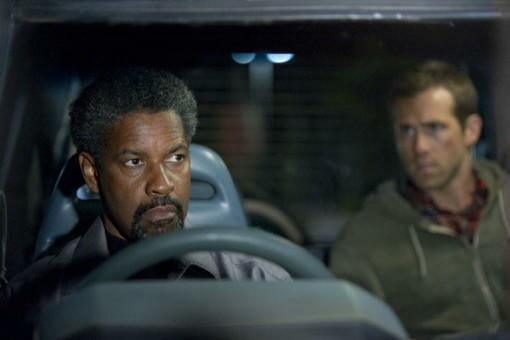Sign up for the
TSL Newsletter
and get $50 off Final Draft 12
By Jim Rohner · February 13, 2012

Denzel Washington is on a short list, along with Tom Hanks, Gary Oldman, Liam Neeson and very few others, of actors that deliver consistently solid performances no matter the quality of the material around them. Casting must be a vocation reserved for those who wish to stay out the spotlight as writers, directors and cinematographers will regularly be lavished with praise for a film while the praise for the casting director is either non-existent or conveniently implied by the lauding of the performances.
Well, I for one would like to break that trend and shower praise on Sarah Finn, the casting director who, if not responsible for the genesis of the idea, played a pivotal role in bringing Denzel Washington to Safe House as it's primarily, yet not solely, his performance of rogue CIA agent Tobin Frost that makes the film work.
Speaking of work, CIA agent Matt Weston (Ryan Reynolds) wants a new job. A dedicated but underutilized employee, Weston's 12-month assignment of babysitting a safe house in Cape Town, South Africa has held him back from becoming a full-time field agent both logistically and professionally. Still, even being an atrophied agent comes with its own sacrifices, such as Weston perpetuating the lie to his girlfriend, Ana (Nora Arnezeder), that he works at a medical clinic.
Weston gets an unhealthy dose of real-life experience when Frost, who has willingly turned himself over to the American Consulate after making a shady back room deal then fleeing from some even shadier characters, is brought to the safe house for interrogating. That Frost, who has rarely been seen let alone encountered since going rogue ten years ago, would willingly turn himself him causes much tension and speculation among the CIA higher ups – Catherine Linklater (Vera Farmiga), David Barlow (Brendan Gleeson), and Harlan Whitford (Sam Shepard) – who have the convenience of dictating protocol orders from a war room after the aforementioned shady characters invade the safe house to apprehend Frost.
"Your responsibility is to your house guest. I am your house guest" Frost reminds Weston and seeing as the outnumbered agents are dropping like flies, the green recruit escapes the safe house with Weston while the powers that be scramble to prepare a new extraction point. But in the interim, Frost, who has seen everything and experienced everything, goes about attacking Weston with the only weapon he has left: his knowledge. "That house was a secure location," Frost muses. "Whoever crashed it, they were invited." And thus, the race to secure not only Frost, but also the identity of the conspirator, is on.
My intro was not intended to imply that Safe House would fail be it not for Denzel Washington's divine intervention, but when David Guggenheim's script merely tells us that we're supposed to be in awe of Tobin Frost, it's Washington's screen presence and gravity that shows us why.
Seeing as Frost spends most of the film handcuffed and in transit, the script relies heavily on people in suits telling us that he's one of the most badass men to ever walk the earth. While Frost does handle himself well with gun or fist, it's more Washington's cadence and the weight behind his words that make us really feel that Frost's weariness with and ultimate defection from the CIA has come about from something more justifiable than selfishness.
Washington's force on screen even elevates the performance of Reynolds by contrast. Frost, we're meant to believe, was once the ambitious and willing agent that Weston is, but decades of service in a line of work rife with conspiracies, half-truths and moral ambiguities have jaded him. Weston is the potential, Frost is the result and combining that with an already admirable performance by Reynolds sets the stakes for a thriller that, unlike most contemporary films concerned even marginally with terrorism, discards a political or ethical agenda in favor of a moral one.
Having the relationship between Weston and Frost at the center of the film is thankfully strong enough to still make Safe House worthwhile despite a story that unfolds exactly as you'd expect it to even up to the predictable unveiling of the conspirator. Along the way, we're treated to the signature shaky cam/blown out color palette combination that'll make you think you're watching a Tony Scott film, but which is actually Daniel Espinosa proving that his first American feature is good enough to secure himself future gigs. Seeing how he was able to handle Safe House and its collection of stars, the brightest of which rightfully shining the strongest, there's no reason to believe we won't be seeing him again.